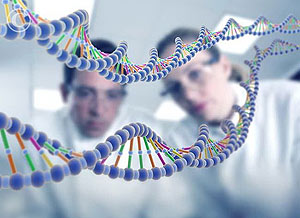Ru
|
Eng
Belarusian, Russian scientists partake in genetics conference in Minsk
11.11.2014

Belarusian and Russian scientists discuss modeling of human behavior at the level of genes, Nikolai Kolchanov, Director of the Cytology and Genetics Institute of the Siberian Department of the Russian Academy of Sciences, said at the opening of the international scientific and research conference “Genome Transformation. The 5th Zhebrak Readings”, BelTA has learned.
“Today we will discuss the prospects of cooperation in the study of the human genome with our Belarusian colleagues. Our institute conducts large-scale research in the modeling of the human behavior by analyzing people's genes,” Nikolai Kolchanov noted.
According to the Russian scientist, there a lot of genetic variants which can make people more benevolent or aggressive. “We are currently developing methods to study the human genome; soon we will be able to predict human behavior. The information that we will get after the analysis of the human genome can be useful, for example, in vocational guidance. For instance, very energetic people can succeed in sport, serve in the army or in emergency bodies,” Nikolai Kolchanov explained.
Workers of the institute conducted the first experiments on wild animals in 1950s. Russian scientist Belyayev studied the possibility to domesticate wild animals and came up with a conclusion that wild animals can become less aggressive in 5-7 generations. Later scientists started to study genes responsible for aggression. Since then such experiments have been conducted on about 200,000 animals. In due time scientists started to study the human genome.
The international scientific conference “Genome Transformation. The 5th Zhebrak Readings” takes place in Minsk on 11 November. Partaking in the event are about 100 scientists from Belarus and Russia. The forum has been held since 2008. It is focused on the most important issues of modern genetics.
“Today we will discuss the prospects of cooperation in the study of the human genome with our Belarusian colleagues. Our institute conducts large-scale research in the modeling of the human behavior by analyzing people's genes,” Nikolai Kolchanov noted.
According to the Russian scientist, there a lot of genetic variants which can make people more benevolent or aggressive. “We are currently developing methods to study the human genome; soon we will be able to predict human behavior. The information that we will get after the analysis of the human genome can be useful, for example, in vocational guidance. For instance, very energetic people can succeed in sport, serve in the army or in emergency bodies,” Nikolai Kolchanov explained.
Workers of the institute conducted the first experiments on wild animals in 1950s. Russian scientist Belyayev studied the possibility to domesticate wild animals and came up with a conclusion that wild animals can become less aggressive in 5-7 generations. Later scientists started to study genes responsible for aggression. Since then such experiments have been conducted on about 200,000 animals. In due time scientists started to study the human genome.
The international scientific conference “Genome Transformation. The 5th Zhebrak Readings” takes place in Minsk on 11 November. Partaking in the event are about 100 scientists from Belarus and Russia. The forum has been held since 2008. It is focused on the most important issues of modern genetics.
SCIENCE. TECHNOLOGY. INNOVATIONS
13.08.2024
28.06.2024
28.06.2024
25.06.2024
05.06.2024
15.05.2024
15.05.2024
26.04.2024
26.04.2024
26.04.2024













